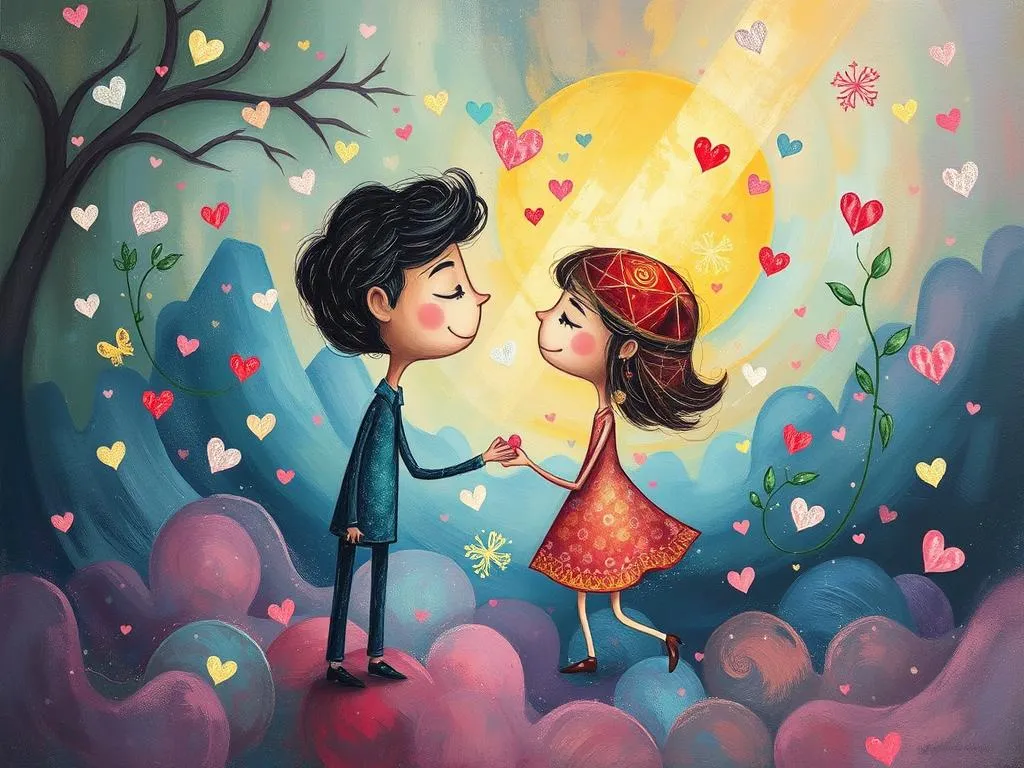
Introduction
Dreams about love and romance have long captivated the human imagination. They hold a special place in our hearts and minds, often acting as a mirror reflecting our desires, fears, and emotional states. The relevance of romantic dreams lies not only in their inherent intrigue but also in their ability to reveal hidden truths about our relationships and self-worth. As we navigate the complexities of love, these dreams can provide valuable insights into our subconscious, guiding us toward a deeper understanding of our romantic lives.
Symbolism and Meaning
Romantic dreams are rich with symbolism, often drawing on our personal experiences and cultural narratives. Common symbols in these dreams can range from familiar faces to abstract representations of love and connection. For example, dreaming of a past lover might symbolize unresolved feelings or lessons yet to be learned. It can reflect a longing for what once was or a desire to integrate aspects of that relationship into your current life.
The presence of flowers in a romantic dream often signifies love and affection. Fresh blossoms can indicate new beginnings or the blossoming of emotions, while wilted flowers may suggest a relationship that is losing its vitality. Additionally, the setting of the dream can significantly influence its meaning. A serene beach might evoke feelings of peace and intimacy, while a chaotic environment could signal turmoil or uncertainty in one’s love life.
Another interesting aspect is the portrayal of intimacy. Dreams that involve physical closeness often symbolize a deep emotional connection or the desire for such intimacy. Alternatively, a lack of intimacy in a dream could highlight feelings of isolation or emotional distance in waking life. This duality emphasizes the importance of context in dream interpretation; it’s crucial to consider the feelings experienced during the dream and how they relate to your waking life.
From a psychological perspective, romantic dreams can also serve as a means of processing emotions. They may bring unresolved conflicts to the surface, allowing the dreamer to confront feelings of jealousy, insecurity, or commitment. By examining the underlying emotions within these dreams, individuals can gain clarity about their romantic desires and anxieties.
Key Scenarios and Variations
The scenarios within romantic dreams can vary widely, each nuance offering a different lens through which to interpret the underlying messages. For instance, dreaming of a passionate encounter with a stranger may indicate a yearning for excitement or adventure in one’s love life. It can symbolize desires that remain unfulfilled or aspects of oneself that are waiting to be explored.
Conversely, a dream where you argue with a partner could reflect ongoing conflicts in the relationship, or it might symbolize internal struggles regarding commitment. The nature of these disputes—whether they are trivial or significant—can provide insights into the dreamer’s feelings about the relationship’s stability.
Another common scenario involves the presence of a love triangle. Such dreams often reveal feelings of insecurity or competition for affection. They can signal a need to address feelings of jealousy or fear of abandonment. If you find yourself in a dream where you are choosing between two romantic interests, it may indicate a need for self-reflection on what you truly want in a partner and the qualities that resonate with your values.
The emotional tone of the dream also plays a crucial role in interpretation. A dream filled with joy and laughter can symbolize contentment and fulfillment in your romantic life, while a dream marked by sadness or anxiety may point to unresolved issues that need attention. By paying attention to these emotional cues, dreamers can begin to unravel the complex tapestry of their romantic aspirations and fears.
Real-Life Connections and Takeaways
Connecting dreams to real-life situations requires a willingness to engage in self-reflection. Start by journaling your dreams upon waking, noting key symbols, emotions, and scenarios. This practice can help you identify recurring themes and patterns that may reveal deeper insights into your romantic life.
Consider how the emotions experienced in your dreams relate to your waking life. Are there parallels between the conflicts in your dreams and those you face in reality? If dreams of past lovers emerge frequently, reflect on what those relationships taught you and how they shape your current romantic endeavors.
Additionally, take note of any feelings of longing or dissatisfaction that surface in your dreams. These emotions might point to underlying needs or desires that are not being met in your current relationships. Engaging in open communication with your partner about these feelings can foster greater intimacy and understanding.
Lastly, embrace the idea that romantic dreams can serve as a form of guidance. If your dream suggests a need for change—whether that involves rekindling a relationship, letting go of a past love, or exploring new romantic possibilities—consider taking actionable steps in that direction. This might involve seeking out new experiences, addressing unresolved issues, or even taking time for self-care to cultivate a greater sense of self-love.
In conclusion, the world of romantic dreams is a rich and intricate landscape filled with hidden messages waiting to be uncovered. By delving into the symbolism, scenarios, and emotional undercurrents of these dreams, individuals can gain a deeper understanding of their desires, fears, and the dynamics of their romantic lives. As you reflect on your own dreams, remember that they are not merely a reflection of your subconscious but rather a powerful tool for personal growth and insight. Embrace the journey of unraveling these hidden messages, and you may find that love matters more than you ever thought possible.







